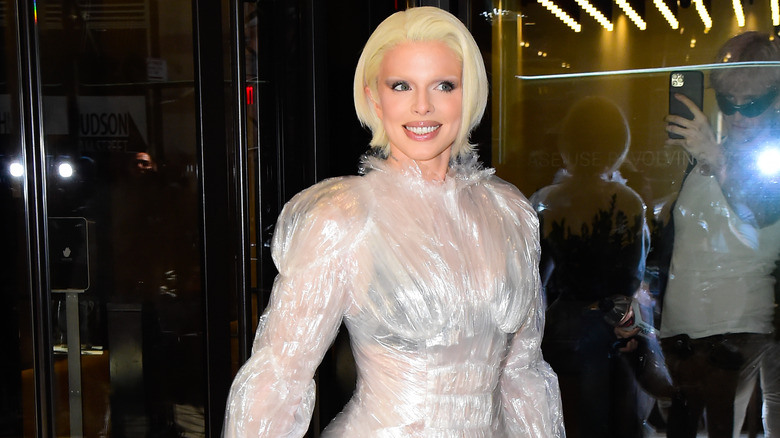Julia Fox Hasn't Had Sex In Over 2 Years — Here's Why
If you've yet to be introduced to Julia Fox, the first thing to know is that she's just a delight. Although she co-starred in the 2019 film "Uncut Gems" alongside Adam Sandler and got major recognition for her performance, Fox's offscreen life has garnered the most attention. First, for briefly dating Kanye West in 2022, then for her eclectic fashion sense that, no matter how much you may try to ignore, you just can't.
Now Fox is making headlines for reasons that have nothing to do with what she's wearing or who she's dating. Instead, the Internet is losing it over the fact that Fox has declared she's been celibate for over two years. Although Fox announced her 2.5 years of celibacy in the comment section of Bumble's TikTok post about celibacy not being the answer — an awful marketing strategy that gorgeously backfired — she didn't explain why until she was on "Watch What Happens Live with Andy Cohen." When Cohen read a question from a viewer who questioned Julia's reasoning, Fox said, "I think, with the overturning of Roe v. Wade and our rights being stripped away from us, this is a way that I can take back the control. It just sucks that it has to be in that way, but I just don't feel comfortable until things change."
While Fox's announcement might shock some, she's not alone. Overturning Roe v. Wade inspired many women to give up sex with men.
How celibacy is becoming a trend
Even before the overturning of Roe v. Wade, sexual activity was on the decline. Unlike generations before, Gen Z just isn't as interested in having sex. According to a 2016 study published in the Archives of Sexual Behavior, those between 20 and 24 are far more likely to have no sexual partners than the two generations before them, Millennials and Gen X, respectively. The same study found that 15% of Gen Z doesn't have any sex at all, compared to the 6% of Gen Xers who could say the same when they were in their early 20s. When Roe v. Wade was overturned, other generations joined Gen Z.
"In this #MeToo and post-Roe era we find ourselves in, the perceived risks associated with sex are higher, particularly for women," Kinsey Institute research fellow Dr. Justin Lehmiller told The Guardian. "And, when you factor in the orgasm gap and the fact that women's pleasure still isn't on a par with men's, some women are asking themselves whether sex is even worth it. If you see it as a high-risk, low-reward kind of thing, you might decide you're better off without it."
But it's not only in the U.S. In South Korea since 2019, there's been the 4B movement in which women are saying "no" to dating men, marrying men, having sex with men, and having babies with men. Women have realized that choosing something else, something better, will secure a more fulfilling future for them.
Why it matters
Many if not most women have said "yes" to sex they didn't want, because that's how we've been conditioned. "Women have been taught, by every cultural force imaginable, that we must be 'nice' and 'quiet' and 'polite.' That we must protect others' feelings before our own," author Rachel Simmons told The New York Times. "That we are there for others' pleasure." It's also exactly why Kristen Roupenian's "Cat Person" went viral when it was published in The New Yorker in 2017. It was something that far too many women could relate to, being at "the place of no return," as writer and feminist Jessica Bennett called it in NYT.
In choosing celibacy or going "boysober," as comedian Hope Woodard called it, it's bodily autonomy at the highest level. It's putting your foot down and not compromising on boundaries, safety, and needs for someone else. "I'm a little bit angry at myself and angry at all the sex that I've had that I feel like I didn't choose," Woodward told The New York Times. "For the first time ever, I just feel like I have ownership over my body."
What's important to realize about this type of celibacy is it's not about taking something from men, but giving credence to the empowerment that comes with having a choice. While it may not be for everyone, its cultural impact is undeniable.


